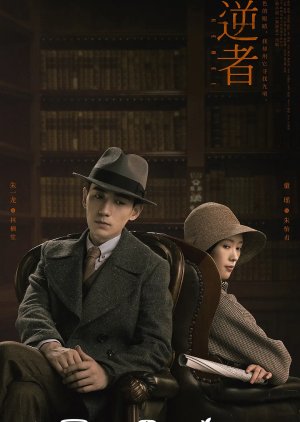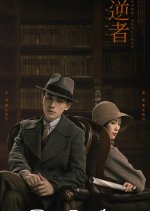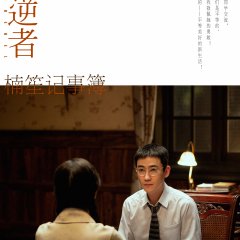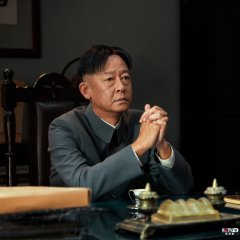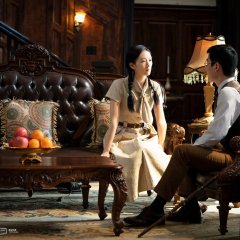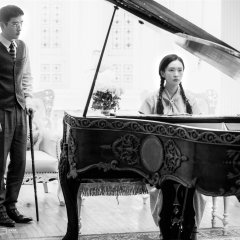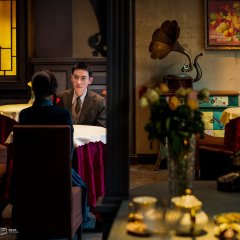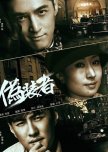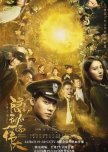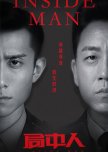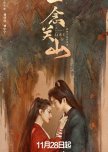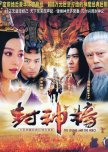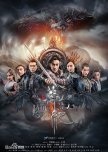 Dream Drama Pairings (Chinese Version)
Dream Drama Pairings (Chinese Version) - Français
- Português (Brasil)
- English
- magyar / magyar nyelv
- Titre original: 叛逆者
- Aussi connu sous le nom de: Pan Ni Zhe
- Scénariste: Qin Wen
- Scénariste et Réalisateur: Zhou You
- Genres: Thriller, Historique, Crime, Guerre
Où regarder The Rebel
Gratuit•e (sub)
Distribution et équipes
- Zhu Yi LongLin Nan ShengRôle principal
- Tong YaoZhu Yi ZhenRôle principal
- Wang Zhi WenGu Shen YanRôle principal
- Wayne WangChen Mo QunRôle principal
- Zhu ZhuLan Xin JieRôle Secondaire
- Li QiangJi Zhong YuanRôle Secondaire
Critiques

PeachBlossomGoddess
25 personnes ont trouvé cette critique utile
The Spy Who Loved Me.
This espionage thriller about the making of a communist spy begins in 1936, a pivotal year in modern Chinese history for both then ruling Kuomintang and the rising Chinese Communist Party (CCP). The look and feel of this Republican era spy drama from the muted palette to the understated characters to the way even action scenes are shot is markedly different from its flamboyant, glamorous and absurdly bullet proof peer, The Disguiser. What I like about The Rebel is the realistic portrayal of spies who are much more like George Smiley than James Bond. None of the main characters have deep political or ideological convictions beyond a burning desire to expel the occupying Japanese forces from China, thus their allegiances and motives are easy to understand and relate to. The dumbing down of the competing ideologies and political factions of the day however gives the overall impression of a lack of substance that is at odds with how seriously this drama takes itself. And that is my biggest gripe: yes, those were chaotic, stressful and dark times and spying is a serious business but does it have to be so completely and utterly lacking in wit and humor?The drama opens in a thrilling and suspenseful way with the arrest of a CCP operative by Chen Moqun, the head of the Shanghai district of the Fuxing Club, which is the Kuomintang's secret service. Together with his young protege Lin Nansheng, they use psychological warfare to turn him and use him to try to weed out the Mailman, a long hidden spy in their midst. Thus begins a chilling, suspenseful cat and mouse between two equally matched spymasters trying to out manoeuvre one another. This was by far the best arc of the drama, anchored by masterful performances by both Wang Yang (Chen Moqun) and Wang Zhiwen (Gu Shenyan). This is one of those rare dramas where the villains steal the show and on many levels they are more cunning, more ruthless and more capable than the protagonists. Chen Moqun is by far the, best most interesting character and the only one that is written with some humor - a complete sociopath, terrifyingly intelligent, flamboyant, suspicious, foolishly blinded by Lin Nansheng's competence, a surprisingly reluctant traitor and a wild party animal! Both lead actors are completely upstaged by the veteran actors for most of the drama.
I am a huge fan of Zhu Yilong and it is clear from how gaunt he looks and from the intensity of his acting that he really poured himself into this role. And he is a terrific actor so it is not to say that the role is not well acted, there are some really good moments. But overall Zhu Yilong delivers a cautious interpretation of the character and one that is not noticeably differentiated from his past roles. He has the most incredible, expressive eyes that together with the tiniest facial muscle movements, can convey an incredible range of emotions and in this case, way too many emotions. Zhu Yilong's interpretation of the character is more fitting for someone who accidentally and reluctantly becomes a spy but Lin Nansheng is a young man that voluntarily joins the spy academy and graduates practically at the top of his class - he should be more cold hearted and have a better poker face to begin with. As much as I appreciate seeing how events and relationships reshape his values and ideals over time into burning conviction, it is better to have to occasionally guess at his emotions rather than to see everything written all over his face. It is telling that later in the drama when he matures into a colder more inscrutable spy, they cover his eyes with tinted glasses to stop them from spewing his guts. His journey is portrayed as very lonely and intensely introspective; so much so that he doesn't seem to connect with most of the main characters. Thus when he mourns their loss, it doesn't always resonate.
Zhu Yizhen starts out as an archetypal character for this genre - a passionate young student CPC member that is perplexingly inspired by Leaves of Green, Walt Whitman's greatest, heavily democratic works. I don't mind the spy who loved me trope so I was really looking forward to watching her turn Lin Nansheng, recruit him and them work together as a kick ass spy team. But unfortunately it doesn't quite play out that way and she doesn't become the strong female lead character I was looking for. She remains pretty much a passionate, reckless amateur and damsel in distress that needs saving all the time. As much as I like that all of the CCP spies are written to be very fallible in the vein of John LeCarre's spies, she really takes the cake in terms of incompetence. What I find most unbelievable is she falls for the same grift twice! The only mission she manages to complete successfully is the final one. Tong Yao's portrayal of this character is textbook but bland and forgettable and her frequent blank stare with lips slightly parted gets really old very quickly. There is no spark between her and Lin Nansheng so I never bought into their rather pedestrian love story. Lin Nansheng's relationship with Lan Xinjie is deeper, far more complex, better developed from many dangerous missions and much more moving.
The first arc of this drama is everything you want a spy thriller to be. Each progressive arc is less good and they don't transition that well, leaving a feeling of anti-climax. The latter half becomes noticeably less tightly written and loses suspenseful intensity. Characters start popping up out of the blue from nowhere whenever someone needs to be rescued. Lin Nansheng's classmate has a particular knack for showing up at the right place at the right time. In order to advance the plot, many of the most important characters get dumbed down to be rather cursorily written off to make way for Lin Nansheng to step up. I didn't like how some of the best most interesting power dynamics between Chen Moqun, Gu Shenyan and Wang Shian fizzle out without coming to a climax, a moment of truth and closure. Thus when Lin Nansheng comes of age, he isn't even going up against truly worthy opponents and there is no psychological thrill. The last arc is the weakest, it is too long of a time jump, deviates into patriotic tropes, gratuitous sacrifices, leaves open threads and like most of the arcs, comes to an anti-climatic and very predictable end.
If I have to rate just the first arc of this drama, it is at least an 8.5 or a 9.0. Unfortunately the storytelling doesn't hold up and the second half is at best a 7.5-8.0. I really dislike dramas that fade at the back half so I rate this at 8.0-8.5. I would also note that I have read and watched a lot of amazing spy thrillers so I tend to be tougher on this genre.
Cet avis était-il utile?

The Patriot
Poignant, riveting, suspenseful, thrilling, emotional, shocking, heart wrenching, and extremely gratifying. The Rebel is one of the best C-dramas I’ve watched this year or any year, for that matter. In terms of the production quality, technical execution, performances of the cast and music, this drama is close to perfection. It’s not flawless by any means, for there are some quibbles here and there but it’s good enough for me to give it a 9.5 rating.Based on the novel, The Traitor (叛逆者) by multiple award winning and prolific author Bi Yu (畀愚), The Rebel is set during the Republican era primarily in Shanghai while certain arcs transpired in Hong Kong and Chongqing. Spanning the course of more than a decade, from 1936 to the creation of the PRC in 1949, the story revolves around the main character of Lin Nan Sheng during the tumultuous period of the Chinese civil war between the Nationalists (Kuomintang) and Communists, as well as the second Sino-Japanese war. It chronicles his personal growth as he matures from a naive young military recruit to an experienced intelligence operative, while charting the trajectory of his “journey of self-actualisation”.
This drama features espionage, war and romance with certain elements of slice-of-life, socio and geopolitics, while exploring themes of family, friendship, betrayal, and sacrifice. It exudes vibes of The Infernal Affairs (HK, 2002) and Decoded (2016) due to the counterintelligence aspects involving sophisticated networks of covert activities operating within a complicated web of deceit and subterfuge as well as via trademark spycraft, notably undercover agents, double agents, coded transmissions and assassinations, among many others. A number of viewers have also made direct comparisons to Fearless Whispers (2020) due to the romantic entanglements between the leads who stand on opposite sides of the great political divide.
This drama may not be universally lauded because of the subject matter, which is not everyone’s cup of tea. Aside from the usual tragic endings, Republican era dramas in general are associated with Communist propaganda and jingoism. In this case, such concerns are magnified because of its intended release to coincide with the Chinese Communist Party’s centenary celebrations on 1 July 2021. Additionally, there are those who might not even appreciate the appeal of the slowburn nature of the storytelling or the lack of action-packed choreographed sequences.
However, the masterful delivery of the entire production based upon a compellingly written screenplay makes this drama arguably one of the best of the genre. The overarching plot is cohesively structured and integrated seamlessly with the intricately woven subplots and character arcs. The simmering pace - imbued with many an eventful moment, palpable tension and unpredictable twists and turns - is consistently sustained through linear storytelling via multiple points-of-views, albeit the emphasis always remains on the main protagonist. The exceptionally well constructed major characters are brought to life by the outstanding stellar cast, who deliver profoundly compelling interpretations of immense character developments as the drama unfolds. As far as the flag-waving is concerned, the subtle and layered approach is conveyed by these multifaceted characters seemingly with various shades of grey.
The attention to detail in the overall production design and art direction is exemplary in this joint production between iQiyi and CCTV. Principal photography took place entirely at the famous Shanghai Film Park in Shanghai, which wrapped up filming in August 2020. The ready-made filming locale oozes Old Shanghai atmospherics, along with the electric trams and the countless Buick cars on display. The use of interior props such as the antiquated rotary-dial telephones, vintage radios, gramophones and telegraph, to name a few, all give credence to the authenticity of the depiction. The exquisite costumes are equally worthy of praise, where the ladies appear elegantly dressed in fashionable qipao while the men are smartly attired in military uniforms or bespoke suits. These aspects enhance the general sense of realism which are visually framed by the excellent cinematography, as can be seen throughout the drama.
The main cast is certainly deserving of at least a nomination for acting honours, whether it be for Golden Eagle, Feitian or Magnolia Awards. In preparation for the main role of Lin Nan Sheng, the critically acclaimed Zhu Yi Long lost a massive amount of body weight and reportedly weighed a mere 64kg during filming. In addition to his efforts and dedication to his craft, his immense talent undoubtedly shines through in his portrayal of the evolution that his character undergoes in the drama. He very much reminds me of a young Tony Leung Chiu Wai here, in terms of the acting and the looks, where his characterisation is both understated and nuanced.
The award-winning Tong Yao plays the love interest, Zhu Yi Zhen. Although credited as the female lead, her character does appear to be more of a supporting role and, at times, somewhat overshadowed by the dynamic performance of her leading co-star. In fairness, she possesses less overall screen time and I have enjoyed Tong Yao’s interpretation of the role, as an independent, strong willed and fearless revolutionary in the face of adversity and challenges. The character also undergoes tremendous development and together with Lin Nan Sheng, they both showcase such convincing chemistry and connection with each other, even when they are far apart. It is almost a surreal and spiritual kind of long-distance relationship that transcends physical boundaries. Her uncanny resemblance to Zhang Zi Yi makes her screen presence with Zhu Yi Long unintentionally appear as though Leung Chiu Wai and Zhang Zi Yi are the main leads for this drama.
This production is further elevated by the presence of experienced veterans Wang Zhi Wen and Wang Yang, who play Gu Shen Yan and Chen Mo Qun respectively. Without these two distinguished actors, the drama would not have been as credible, evocative and visceral. Chen Mo Qun, in particular, emits such a powerful aura not unlike say Darth Vader to the point that I would actually include him as one of my favourite “villains” of C-Dramas. These two actors should have their own spin-off Republican drama, seriously.
It’s my third time seeing Zhu Zhu since Qin Dynasty Epic and Breath of Destiny. Despite being perfect for the role of Lan Xin Jie, I sometimes do feel that she’s typecast as a sultry seductress and femme fatale type of characters. She is amazingly versatile, a quality which hopefully garners her more varied roles in future projects. The rest of the supporting cast represent good value for their depictions, particularly Zhang Zi Xian and Dai Xu who give a decent portrayal of the unscrupulous Wang Shi An and the suave Zuo Qiu Ming respectively.
I cannot emphasize enough how incredibly fitting and beautiful the soundtrack for this drama is. The original score featuring piano pieces by the celebrated Chinese pianist, Lang Lang expresses the mood and emotion of pivotal scenes in the drama. In particular, the signature theme, Tchaikovsky’s The Seasons, op. 37a: VI. June "Barcarolle" is played throughout. OST listing as follows:
1. Zhu Yi Long, Lang Lang - The Rebel (main theme)
2. Ayanga - Shadow Behind
3. Sara - Candid
4. Lang Lang - The Seasons, op. 37a: VI. June "Barcarolle"
Having espoused the positives, there are certain issues I noted but which does not diminish the overall quality of the production. Firstly, towards the tail end of the drama, there is a somewhat melodramatic undertone involving “misunderstanding and contract marriage tropes” that gradually builds up to briefly occupy some screen time. However it does eventually get tied up during the final phase of the story. Secondly, in the parting scene at the Hong Kong pier, the overdub process must have been overlooked during post-production because two distinct pieces of music were inserted, thus ruining what was supposed to be a deeply emotional moment. Last but not least, I do feel that the unexpected manner in which the final action sequence plays out creates unnecessary confusion, as the story transitions to the ending.
All things considered, The Rebel is a top-tier production that probably does not but should receive the appreciation and recognition that it truly deserves for the quality of the production, writing and acting. With a Douban rating of 8.3 at the time of writing, the numbers speak for themselves. I have utterly enjoyed the worthwhile experience of being immersed in this fantastic drama and if you do decide to give this a try, perhaps you would be too.
Cet avis était-il utile?

